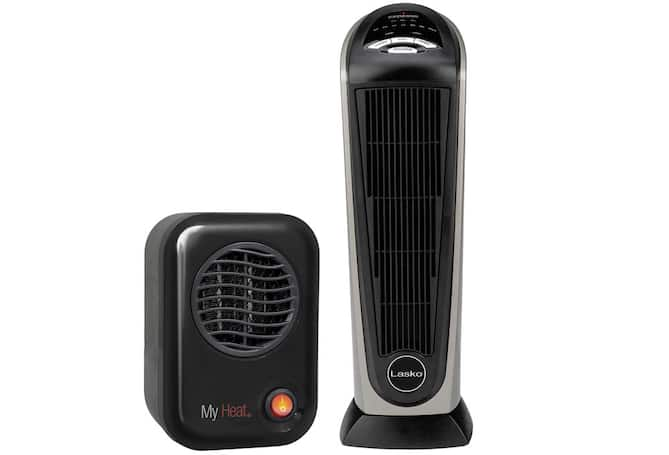Staying Cozy: Tips for Using Space Heaters Safely

carousel
Choosing the best portable heater to warm your space
As the temperature drops, many of us turn to space heaters to keep our homes warm and cozy. Space heaters, also known as portable heaters or small space heaters, offer a convenient way to supplement central heating or provide warmth in chilly areas of your home. However, to ensure that you can enjoy the benefits of a space heater without risking accidents or energy inefficiency, it's essential to follow some key safety and usage guidelines.1 And no matter what, you should always refer to the manufacturer’s guide for the proper use and handling information before operating a space heater.
To start, carefully select the best space heater for your needs. There are three basic sources of heat: convection heaters, radiant heaters and combinations of the two. Convection heaters will provide ambient heat to the entire room and are the best heater for large rooms. Radiant heaters can quickly warm a person or object at close range, but not the entire room, making them ideal as a personal heater. And combinations of the two use a fan to circulate the air, distributing the heat both radiantly and gradually to the rest of the room, albeit less efficiently than a convection heater.
Various styles of space heaters are available, such as ceramic heaters, fan heaters, tower heaters, infrared heaters and small electric heaters. Some are even made for outdoor usage—you’ll quickly see why infrared patio heaters are a must-have for anyone wishing to extend their patio season. Regardless of whether you’re buying an indoor or an outdoor heater, you’ll need to consider the size of the area you want to heat, as different models excel in different scenarios. Since the best space heaters for large rooms or areas are convection heaters, options like a ceramic heater are best. Meanwhile, in a small room, a smaller desk heater or electric heater like an infrared space heater are ideal for achieving close-range personal warmth. Choose an energy-efficient space heater to minimize your electricity costs and environmental impact.
Top tips for space heater safety
Once you’ve chosen the ideal type of heater for your needs, you’ll need to know how to operate it safely to prevent fire, injury or damage. Here are some safety tips to follow when using any kind of space heater:
Keep your distance. Place the space heater at least three feet away from any flammable materials, such as curtains, furniture or bedding. This precaution minimizes the risk of accidental fires.
Plug directly into the wall. Plug your electric heater directly into an electrical outlet rather than using an extension cord or power strip. Overloading extension cords can lead to overheating and fire hazards. You might also consider using a surge protector to protect against electrical surges.
Regular maintenance. A portable heater should be added to your running list of essential upkeep for your appliances. Keep your space heater in good working condition by cleaning it regularly. Dust and debris can accumulate, which may cause malfunctions or even fires. Be sure to unplug the heater and let it cool down before cleaning. Check the power cord and plug for any signs of wear or damage. If you notice any issues, have the heater repaired or replaced.
Use an electric heater with a thermostat. A space heater with a thermostat can help maintain a consistent temperature and reduce energy consumption. You can set your preferred temperature and let the heater cycle on and off as needed.
Avoid using space heaters in wet areas. Space heaters and water don't mix. Never use a space heater in bathrooms or other damp environments, as it can pose an electrical hazard.
Positioning and ventilation are crucial for space heater safety
Make sure you place your space heater in a location that allows for efficient heating and good airflow. This ensures that the warm air circulates effectively, preventing overheating and ensuring safety. An energy efficient space heater is a great option for this reason.
Always position the space heater on a flat, stable surface to prevent it from tipping over. Some models have a tip-over switch that automatically turns off the heater if it falls. Don’t place any objects in front of the heater, which can obstruct the airflow and cause the heater to overheat or become less effective. Additionally, make sure there is proper ventilation at all times.
Protect children and pets while running a portable heater
Know when to turn space heaters off
Space heaters are not meant to be run continuously. Here are some situations in which it's best to turn off your heater:
Leaving the room. When you leave the room, even for a short time, turn off the space heater. It's a waste of energy and a potential fire risk to leave it unattended.
While you sleep. It's not safe to run a space heater overnight. Instead, run it in the room where you’ll sleep for a couple hours beforehand, then use extra blankets or warm clothing to stay warm during the night. You might also consider investing in an electric heater with temperature control, so you can monitor the ambient room temperature more accurately and have it shut off automatically once the ideal temperature is reached.
Emergencies. In case of an emergency, know how to shut off your space heater quickly. Keep a fire extinguisher nearby in case of any accidents.